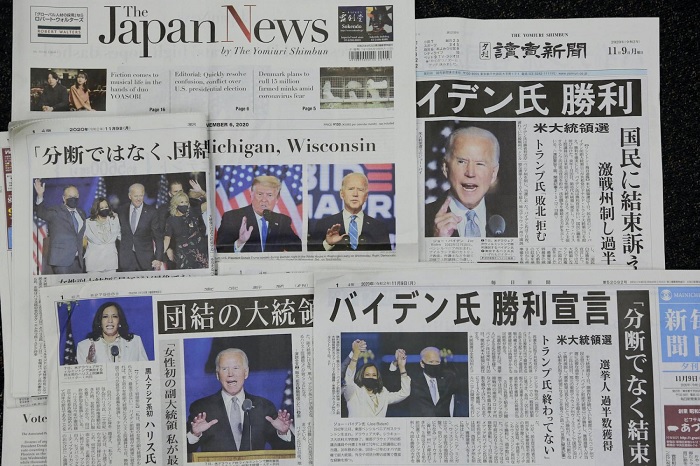
A prominent economic adviser to Japan’s prime minister says Tokyo should prepare for a “leaderless era” as U.S. global leadership gradually withers, and expand other strategic ties while bolstering its security alliance with Washington.
The prime minister, Yoshihide Suga, wasted little time in congratulating U.S. President-elect Joe Biden on last week’s election win over incumbent Donald Trump, despite the latter’s refusal to concede, saying he wanted to strengthen the alliance and ensure peace and prosperity in the Indo-Pacific region.
But concerns about America’s inward turn have simmered in Japan for years, intensifying in the face of China’s growing military and economic assertiveness and persisting during the Trump presidency despite comparatively warm ties between the outgoing U.S. leader and Suga’s predecessor, Shinzo Abe.
For Suga adviser Takeshi Niinami, chief executive of drinks giant Suntory Holdings Ltd and a well-known regular on the international business circuit, Biden’s promises to restore U.S. ties with international institutions and allies are welcome.
But Niinami expects U.S. influence to keep waning relative to China, as Biden faces deep domestic divisions in America after the election, so Japan must widen its push for multiple partnerships.
“We have to put a footprint in ASEAN (Association of Southeast Asian Nations) countries and India,” he told Reuters in an interview, while at the same time “we must explore further relations with the United States in the security space.”
In a separate statement issued soon after Biden’s election victory, Niinami said, “I believe it is inevitable that U.S. global leadership will wither in the long term.
“Japan must continue deepening the U.S.-Japan alliance but at the same time establish its relationship with the world in order to ready itself for a leaderless era,” said Niinami.
Worries about declining U.S. global influence are not new, but former diplomat Kunihiko Miyake, a foreign policy adviser to Suga, agreed Biden could not “run away” from a trend toward U.S.”neo-isolationism”.
“Orthodoxy is back in Washington and we welcome that, but everything is relative and we need more like-minded nations, not only the United States but also other neighbors in the Indo-Pacific region,” Miyake said.
In a clear sign of Japan’s aim to expand its network of strategic ties, Suga’s first overseas trip after taking office in September was to Vietnam and Indonesia, where he reached agreements to bolster defense ties.
That followed Tokyo’s hosting of the Quad grouping of the United States, Australia, Japan and India, which proponents see as a bulwark against Beijing’s influence. China has denounced the Quad group as a “mini-NATO” aimed at its containment.
Japan must balance its deep economic ties with China with its concerns about Beijing’s military assertiveness and worries about such matters as cybersecurity and intellectual property protection that it shares with Washington.
Hawks in Suga’s Liberal Democratic Party (LDP) want a tougher line on China, but a government source said Suga, a relative novice on foreign policy, was still feeling his way.
Some conservatives in Japan worry Biden may adopt a softer line toward Beijing than Trump, but others expect little substantive change.
“The way the U.S. describes China (under Biden) might change but the general direction is the same – to make China a responsible partner and competitor,” said a Japanese government source, speaking on condition of anonymity.
 Eurasia Press & News
Eurasia Press & News



